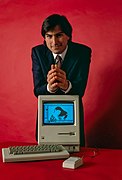Portal:Internet
The Internet PortalSelected article
"The Bus Uncle" is a Cantonese video clip of an argument between two men aboard a bus in Hong Kong on April 27, 2006. While the older man, nicknamed the Bus Uncle, scolded the person behind him, a nearby passenger used his camera phone to record the entire incident to provide evidence for the police in the event of a fight. However, the resulting six-minute video was uploaded to the HK Golden Forum, YouTube, and Google Video. The clip became YouTube's most viewed video in May 2006, attracting viewers with its rhetorical outbursts and copious use of profanity by the older man, receiving 1.7 million hits in the first 3 weeks of that month. The video became a cultural sensation in Hong Kong, inspiring vigorous debate and discussion on lifestyle, etiquette, civic awareness and media ethics within the city, eventually attracting the attention of the media around the world.
Selected picture A hotspot is a venue that offers Wi-Fi access. The public can use a laptop, WiFi phone, or other suitable portable device to access the Internet. Of the estimated 150 million laptops, 14 million PDAs, and other emerging Wi-Fi devices sold per year for the last few years, most include the Wi-Fi feature. News
Wikinews Internet portal
WikiProjects
Did you know (auto-generated) -
Selected biography
Joseph Carl Robnett Licklider (March 11, 1915 – June 26, 1990), known simply as J.C.R. or "Lick" was an American computer scientist, considered one of the most important figures in computer science and general computing history. After early work in psychoacoustics, he became interested in information technology early in his career. Much like Vannevar Bush, J.C.R. Licklider's contribution to the development of the Internet consists of ideas, not inventions. He foresaw the need for networked computers with easy user interfaces. His ideas foretold of graphical computing, point-and-click interfaces, digital libraries, e-commerce, online banking, and software that would exist on a network and migrate wherever it was needed. Licklider was instrumental in conceiving, funding and managing the research that led to modern personal computers and the Internet. His seminal paper on Man-Computer Symbiosis foreshadowed interactive computing, and he went on to fund early efforts in time-sharing and application development, most notably the work of Douglas Engelbart, who founded the Augmentation Research Center at Stanford Research Institute and created the famous On-Line System. He played a similar role in conceiving of and funding early networking research, most notably the ARPAnet.
General images -The following are images from various internet-related articles on Wikipedia.
Selected quoteMore Did you know...
Main topics
Featured contentCategoriesRelated portalsThings you can do
Associated WikimediaThe following Wikimedia Foundation sister projects provide more on this subject:
Wikipedia's portals |






















































